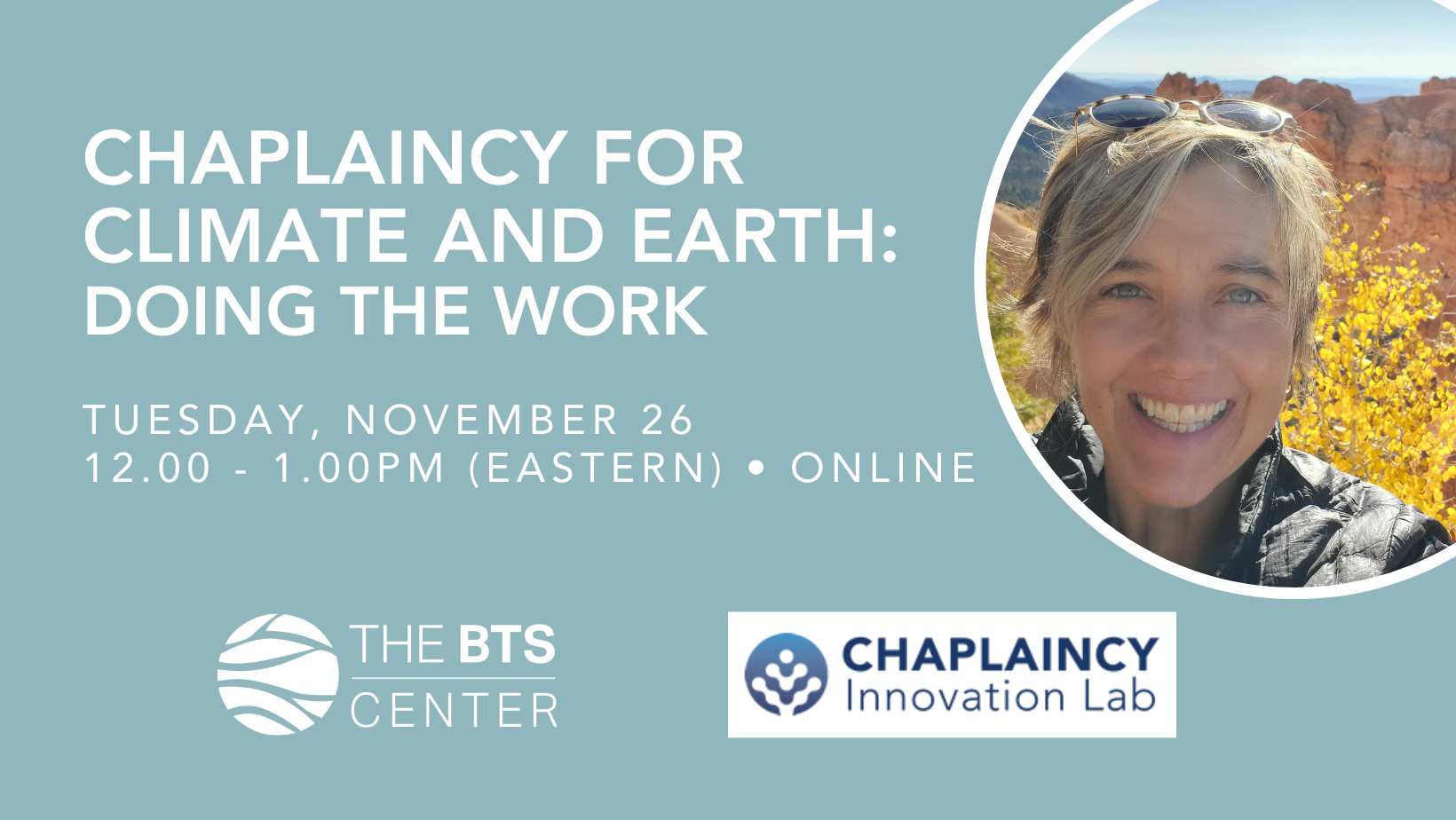
Climate Conscious Chaplaincy
The BTS Center is pleased to offer a series of programs, an emerging network, and a growing collection of resources for chaplains serving in a variety of settings
We recognize the climate crisis’ effects are increasingly felt by all the Earth’s peoples, and those who are called to offer spiritual care will require particular perceptions, postures and practices to minister effectively and compassionately in a changed world. Your responses from this survey will be used to plan programs to meet these needs.
The climate has changed, and is changing, disrupting lives in significant, life-altering ways. Acute, discrete events are now shaping a world characterized by continuous, unprecedented change. Individuals and communities will have increasing immediate, pragmatic, and emergent needs that must be met through adaptation in ways that are yet to be really understood.
The climate crisis is also a spiritual crisis. The BTS Center’s work explores the ways in which long-held practices, worldviews, and intertwining crises — materialism, colonialism, racism, and radical individualism, to name just a few — have given rise to a climate-changed world where humans, disconnected from the sources of Earth’s sacredness and generativity, have created the conditions for Earth’s desecration and destruction. But the climate crisis is also a spiritual crisis in the ways it is causing a loss of belief, spirit, meaning, purpose, and hope.
There is a need for responsive, skilled, compassionate spiritual care to address the short- and long-term needs of those who are, and will be, affected by the reality of conditions to which we must adapt, and of the changed landscape of which we must make sense.
The field of chaplaincy / spiritual care — broadly understood to include professionals and volunteers serving the wider community, denominational entities offering relief and support to victims of natural and human-caused disasters, and communities of faith providing pastoral care — constitutes a primary source for spiritual care to individuals and communities.
 Our Climate Conscious Chaplaincy Initiative now has its own newsletter! We invite you to explore the first issue of Murmurations, featuring articles, profiles, resources, and inspiration for those involved in spiritual care of all kinds. Murmurations will be published on a quarterly basis.
Our Climate Conscious Chaplaincy Initiative now has its own newsletter! We invite you to explore the first issue of Murmurations, featuring articles, profiles, resources, and inspiration for those involved in spiritual care of all kinds. Murmurations will be published on a quarterly basis.
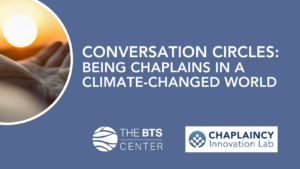
Conversation Circles
Being Chaplains in a Climate-Changed World
As part of our Climate Conscious Chaplaincy Initiative, The BTS Center, in partnership with Chaplaincy Innovation Lab, offers cohorts of Chaplaincy Conversation Circles under the guidance of skilled facilitators. Our 2025 Circles are underway; to receive information about the next cohort starting in early 2026, please use this interest form.
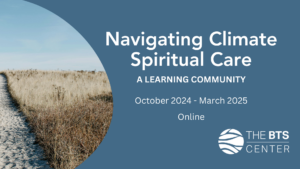 Navigating Climate Spiritual Care
Navigating Climate Spiritual Care NPR recently published a piece on climate grief, which features chaplain Liz Olson, a member of The BTS Center's Advisory Group on Climate Chaplaincy, Gabrielle Gelderman, one of our Chaplaincy Conversation Circle co-facilitators, and Rev. Alison Cornish, our Chaplaincy Initiative Coordinator. We invite you to read more below.
NPR recently published a piece on climate grief, which features chaplain Liz Olson, a member of The BTS Center's Advisory Group on Climate Chaplaincy, Gabrielle Gelderman, one of our Chaplaincy Conversation Circle co-facilitators, and Rev. Alison Cornish, our Chaplaincy Initiative Coordinator. We invite you to read more below.
 The BTS Center recently published an article on our spiritual care offerings, featuring several of our Climate Conscious Chaplaincy programs. Read below for more.
The BTS Center recently published an article on our spiritual care offerings, featuring several of our Climate Conscious Chaplaincy programs. Read below for more.
The BTS Center Offers Spiritual Care for a Climate-Changed World
Over the past several years, The BTS Center has been engaged in the work of co-creating programming which offers spiritual care in a variety of ways. From Conversation Circles for chaplains deep in the work of holding space for others, to spiritual accompaniment circles for those seeking contemplative grounding and discernment, to programs for expressing climate grief through ritual, each of our offerings acknowledges the truth that without spaces for spiritual care, spiritual leadership for this climate-changed world is unsustainable.
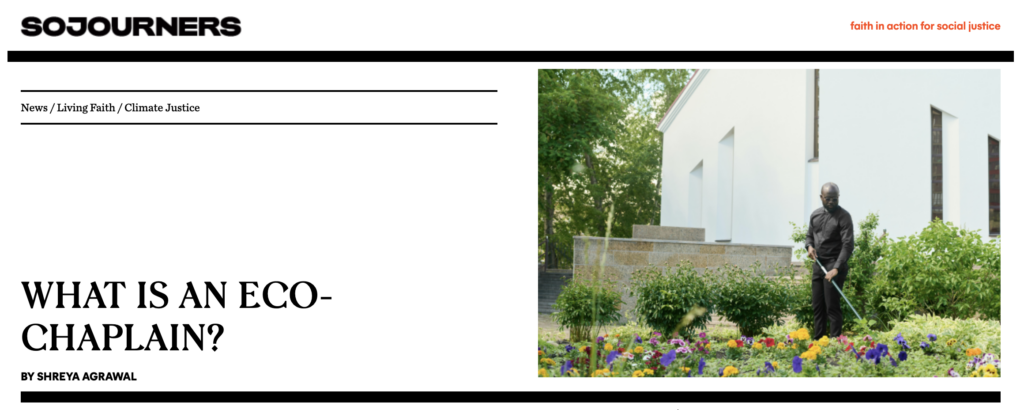
Some of the much needed skills those who offer spiritual care can give to a climate-changed world include:
- empathetically and respectfully assisting individuals and communities in accepting (and making) difficult choices and adapting to change
- understanding of trauma
- companioning individuals and communities through rituals and practices of communal loss, grief, and healing
- engaging in theological reflection as a source of meaning-making
- coping with uncertainty and holding questions
- tending to loss, grief, and brokenness
- using a relational approach in serving people of all faiths, as well as those with no particular faith identity
- cultivating, and maintaining, hope and resilience
- caring for the caregivers
All these skills have been, and will continue to be, critical in offering spiritual care to individuals and communities. Yet there are additional considerations, creating further (and different) spiritual needs, which arise from our changing climate, some of which are:
- grave doubts about the possibility of a (positive) future
- displacement from long-term homes and lands, and rootlessness (the likelihood that returning home is not possible)
- disempowerment, a result of being a victim of global, existential, and external conditions
- mourning for a world no longer here
- job and income loss — possibly permanent
- a breach in one’s faith in the security and steadfastness of the natural world
- a loss of meaning and the sense that one’s life and actions matter
- intensified issues of inequities, climate racism, and structural injustice
- disruption of family and friend social support networks
As a result, those offering chaplaincy services require additional tools — including specialized skills, knowledge, resources, and practices grounded in an understanding of a climate-changed world — for the sacred tasks of accompaniment and care they will be called to offer.
Here are a few of the areas which will inform chaplains offering spiritual care in (and for) a climate-changed world:
- Climate Change 101 – What’s happening? What are the anticipated effects (focusing particularly on systems vulnerable to climate such as displacement / loss of home, changing food supply, water issues, and physical, social and emotional health)?
- Rethinking the lifecycle of disasters, particularly anticipation / preparation and recovery stages
- Theological, doctrinal, and spiritual resources for sense-making, meaning-making, resilience, and hope in a climate-changed world
- Diversity, equity, inclusion, and justice issues specifically related to a climate-changed world
- Unique needs for specific populations: elders, people living with disabilities, children and youth, LGBTQIA+ individuals and communities, immigrants, and those incarcerated, among others
- Intentional cultivation of resilience, adaptation, healing, empowerment, and connectedness in order to survive and thrive in a climate-changed world
- Elevating and teaching the ways nature can heal
- Normalizing stories of climate displacement
Chaplains who have cultivated these skills and knowledge, who have drawn on these resources, and who engage in these practices, will:
- understand and accept the reality of a climate-changed world as the environment in which they serve
- recognize that climate change significantly disrupts people’s spiritual lives, whether as anticipatory anxiety and grief, experiencing and recovering from climate change-caused disasters, or long-term adaptation to a climate-changed world
- commit to tending to people’s spiritual needs in ways which kindle their critical, and inherent, capacities of hope and resilience
- help people to restore a sense of both safety and agency
- engage and offer practices for the restoration of relationships with, and faith in, the natural world, drawing on nature as guide, teacher, and companion
- prepare not just for suffering and the promotion of healing, but for the sharing and innovation needed to adapt to a climate-changed world
As part of our ongoing work of cultivating and nurturing spiritual leadership for a climate-changed world, The BTS Center looks forward to continuing to offer programs and resources for Climate Conscious Chaplains, and in 2024, building an emerging Climate Conscious Chaplaincy Network. Please let us know if you are interested in this area of our programming by filling out the Interest Form.
Resources
In addition to the resources below, we are pleased to offer a curated list of resources from partners and friends for your use. This list will be periodically updated. Click below to view the resource list.
Rev. Alison Cornish, Chaplaincy Initiative Coordinator
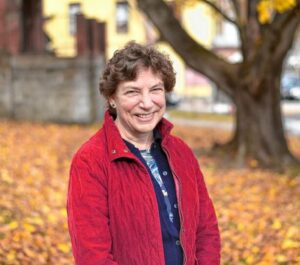
The Rev. Alison Cornish serves as the Coordinator of the Chaplaincy Initiative at the BTS Center. Alison spent the first half of her professional life working as an historic preservationist and architectural historian, primarily in New England and on Long Island, NY. After 20 years of work with museums, municipalities and nonprofit organizations, Alison attended Andover Newton Theological Seminary in response to a felt sense of call directly from Earth to address what is it that we are doing in our daily lives and habits that is destroying the planet that we inhabit. Following CPE, field education in interfaith work and parish ministry, and ordination in the Unitarian Universalist tradition, Alison served congregations on Long Island while also embarking on studies with the Buddhist teacher Joanna Macy and Dominican sister Miriam McGillis. Alison became a GreenFaith Fellow in 2013, and a Climate Reality Project presenter in 2017. She has served as Senior Director of Programs at Partners for Sacred Places, Executive Director of Pennsylvania Interfaith Power & Light, Director of Seminary and Congregational Initiatives at Interfaith Philadelphia, and as the Affiliated Community Minister at First Unitarian Church, Philadelphia. Alison’s facilitation work includes the Work That Reconnects, training-the-trainers for Civil Conversations, group practice of Nonviolent Communication, and the curriculum “Healthy Congregations.” A Program Consultant for the BTS Center since 2021, her work has focused on ecological and climate grief, religious imagination, and chaplaincy in a climate-changed world. Alison and her husband Pat live in Shelburne Falls, Massachusetts, on the unceded lands of the Nipmuc and Pocumtuc peoples, in the watershed of the Connecticut River. When not working, Alison can be found along, on, and in, a local natural body of water, currently the Deerfield River.
Initiative Partner
 The Chaplaincy Innovation Lab (CIL), based at Brandeis University, launched in October 2018 to bring chaplains, theological educators, clinical educators and social scientists into conversation about the work of chaplaincy and spiritual care. As religious and spiritual life continues to change, the CIL sparks practical innovations that enable chaplains to nurture the spirits of those they serve and reduce human suffering.
The Chaplaincy Innovation Lab (CIL), based at Brandeis University, launched in October 2018 to bring chaplains, theological educators, clinical educators and social scientists into conversation about the work of chaplaincy and spiritual care. As religious and spiritual life continues to change, the CIL sparks practical innovations that enable chaplains to nurture the spirits of those they serve and reduce human suffering.




